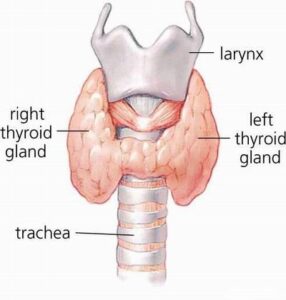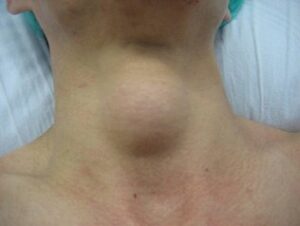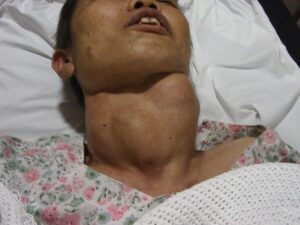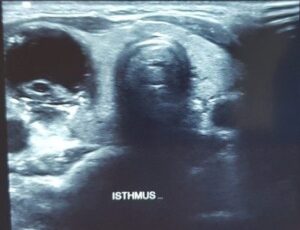Thyroid Lumps
Charles Tan Surgery is a one-stop facility that provides you with a comprehensive evaluation of thyroid lumps.
A/Prof Charles Tan’s Thyroid Surgery Expertise
He has performed over 1000 thyroid surgeries. As Previous Head of the Endocrine Surgery Division in NUH, he started the robotic axillary thyroid surgery program. He currently has the largest experience of thyroid surgery via the axillary in Singapore. Apart from comprehensive treatment of thyroid cancers, other new procedures include minimally invasive parathyroid surgery under local anesthesia. He regularly conducts courses and master classes to share his expertise with fellow colleagues to aim for safe thyroid surgery.
What is a thyroid gland?
The thyroid gland is an endocrine gland in your neck. It makes two hormones that are secreted into the blood: thyroxine (T4) and triiodothyronine (T3). These hormones are necessary for all the cells in your body to work normally.

What can go wrong with my thyroid?
Hormone disturbance:
Hypothyroidism (underactive thyroid) – not enough thyroxine is produced for the body’s needs, leading to tiredness, feeling cold, weight gain, poor concentration and depression.
Hyperthyroidism (overactive thyroid) – too much thyroxine is produced for the body’s needs, leading to weight loss, good appetite, heat intolerance, anxiety, and heart palpitations.
Sometimes there are very few symptoms. A blood test from your doctor will confirm whether or not you have a thyroid disorder.
Lumps in the thyroid gland:
Single thyroid nodule
Solitary nodules are most commonly benign. 10% are cancerous. If a cancer cannot be excluded by investigations, surgery is usually recommended.

Multiple thyroid nodules
A multi-nodular goiter is common. Surgery is needed when you have problems with swallowing and/or breathing or if the goiter is unsightly, or when the gland is growing rapidly or one or more of nodules raises concern of cancer.

Thyroid Cancer
Thyroid cancers are mainly papillary, follicular, medullary or anaplastic thyroid cancer. Most patients are 25 to 65 years of age when first diagnosed; women are more affected than men. Nearly 80 percent of thyroid cancer is papillary and about 15 percent is follicular; both types grow slowly and can be cured if caught early.

How can we investigate?
- Blood Tests
- Bedside Ultrasound
- Needle Biopsies

What types of surgeries or operations are available as part of treatment by a thyroid specialist?
- Conventional open neck
- Robotic via the armpit (no scar in the neck)
The surgery (operation) usually takes about 1-2 hours and a 1 night stay in the hospital.


















